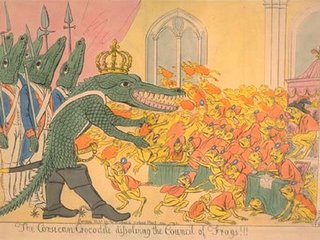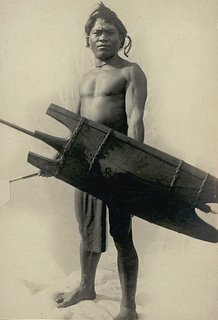Philippine Supreme Court Legitimized Kleptocracy

Deviantart
Welcome to kleptocrat nation! The Philippine Supreme Court has legitimized Gloria Arroyo’s kleptocracy-the rule by looters and thieves. The Arroyo government is ruled by Mafia criminals and cronies. It’s lutong makaw! The majority of the magistrates are blind and bias. The Arroyo Supreme Court is a part of wholesale conspiracy of China’s ZTE scam and its clone’s cover-up. In fact, the Philippine Supreme Court legitimized the Arroyo presidency after the 2001 EDSA Dos coup. What national security? What diplomatic matters? The alleged Spratlys sell-out and wholesale conspiracy to commit fraud, bribery, and treachery are covered under Gloria’s executive privilege. Shame on them!
The rule of law is dead under corrupt Arroyo regime. Gloria Arroyo has the rubber stamp do-nothing House of the Representatives, the Supreme Court to justify her misdeeds, the Ombudsman and Department of Injustice to protect her Mafia cronies from prosecution, the military-police to suppress people’s civil liberties and the bishops for their prayers and all-out support. Anak ng jueteng! But no thanks to bribery! Tuloy ang ligaya!
SC Chief Justice Puno dissents
The limits of executive privilege
GMA’s justices uphold Neri’s silence, castrate Senate
CJ Puno: Palace claim of RP-China ties at risk not credible
By Benjamin B. Pulta
Daily Tribune 03/26/2008
The Senate, empowered by the Constitution with the mandate to investigate anomalies in government, and in the Executive branch in aid of legislation, has been effectively castrated by the high court with its ruling issued yesterday involving the invocation of executive privilege.
All of President Arroyo’s men and women in the Supreme Court (SC) appeared to have delivered to her what she wanted: The clipping of the Senate’s powers to investigate, in aid of legislation; to question witnesses and resource persons and demand answers from them; and to cite them in contempt, while upholding the Malacanang officials’ right to invoke executive privilege, and thus evade public accountability even in criminal matters.
The SC yesterday ruled to grant a petition filed by former National Economic Development Authority (Neda) secretary-general now chairman of the Commission on Higher Education Romulo Neri to stop the Senate from compelling him to testify in its investigation into the aborted $329-million national
broadband network project of the government with China’s ZTE Corp.
Voting nine-to-six,the majority of the high court in the decision written by Associate Justice Teresita De Castro agreed with Neri’s claim that the Senate cannot cite any person appearing before legislative inquiries before it in contempt until the upper house passes its rules.
As of 4:00 p.m. yesterday, no official copy of the main ruling was available since it was still being revised, SC spokesman Jose Midas Marquez said, adding that it runs to some 35 pages.
The main decisions said ,in this present search for truth, we should turn to the fundamental constitutional principles.
The SC said while the three department s of government are considered separate,co-equal,coordinate and supreme within their respective spheres they are imbued with a system of checks and balances to prevent unwarranted exercise of power.
Even the courts are repeatedly advised to exercise the power of contempt judiciously and sparingly with utmost self-restraint with the end in view of utilizing the same for correction and preservation of the dignity of the court, not for retaliation or vindication.
The majority added that the Senate committees should have exercised the same restraint adding that after all petitioner (Neri) is not even an ordinary witness. He holds a high position in a co-equal branch of government.
The SC also pointed out that only a minority of the members of the Senate Blue Ribbon Committee were present during the deliberation.
Clearly,the needed vote is a majority of all the members of the (Senate blue ribbon) Committee. Apparently, members who did not actually participate in the deliberation were made to sign the contempt order. Thus , there is a cloud of doubt as to the validity of the contempt order, the SC said.
The tribunal also cited that in letters made by Neri to the Senate, the former include(d) an expression of his willingness to testify again, provided he be furnished in advance copies of the questions.
The dissenting opinion of Chief Justice Reynato Puno was 120 pages long.
Despite the majority vote in favor of the administration in the Neri petition, magistrates of the high court who dissented said a virtual mouthful for the case.
In his separate opinion, the Chief Justice did not give credence to the claim of Executive Secretary Eduardo Ermita that the country’s relationship with China may be put at risk if Neri is forced to answer the three questions which stem from a Neri allegation of bribery.
Puno said Ermita has no explanation on how diplomatic secrets will be exposed at the expense of national interest if petitioner answered the three disputed questions propounded by the respondent Senate committees.
Neri, Puno pointed out, also failed to explain during the oral argument on the case how diplomatic secrets will be compromised if the three questions are answered by him.
But even assuming arguendo that petitioner Neri can properly invoke the privilege covering national security and military affairs, still, the records will show that he failed to provide the Court knowledge of the circumstances with which the Court can determine whether there is reasonable danger that his answers to the three disputed questions would indeed divulge secrets that would compromise our national security, Puno noted.
The questions, Puno added, should be answered by Neri as these are pertinent to the subject matter of the legislative investigation being undertaken by the respondent Senate committees.
He noted that the questions to Neri have direct relation not only to the subject of the inquiry, but also to the bills pending before the Senate such as Senate Bill No. 1793 which intends to amend Republic Act No. 9184 or the Government Procurement Reform Act, Senate Bill No. 1794 or An Act Imposing Safeguards in Contracting Loans Classified as Official Development Assistance and Senate Bill No. 1317 or An Act Mandating Concurrence to International Agreements and Executive Agreements.
Puno further stressed that the strength of the executive privilege is weakened by the fact that the subject of the communication involves a contract with a foreign loan, which is not exclusively vested in the President, but is shared with the Monetary Board (Central Bank).
We also consider the chilling effect which may result from the disclosure of the information sought from petitioner Neri but the chilling effect is diminished by the nature of the information sought, which is narrow, limited as it is to the three assailed questions. We take judicial notice also of the fact that in a Senate inquiry, there are safeguards against an indiscriminate conduct of investigation, Puno added.
With all these considerations factored into the equation, we have to strike the balance in favor of the respondent Senate committees and compel petitioner Neri to answer the three disputed questions, he further said.
Spokesman Marquez, quoting the high court’s majority ruling said that since there are no published rules of the Senate’s rules for contempt no person can be penalized with contempt by the Senate until the guidelines are already published.
Marquez said the ban not only covers Neri but in effect also covers other witnesses appearing before the legislature.
It does not limit the power of the Senate but only defines executive privilege he added.
Dissenting from the majority opinion were Puno and Associate Justices Antonio Carpio, Consuelo Ynares-Santiago, Ma. Alicia Austria-Martinez, Conchita Carpio-Morales and Adolfo Azcuna.
Carpio however joined the majority in ruling that the arrest warrant issued by the Senate against Neri was handed down in grave abuse of discretion.
The senators ordered Neri’s arrest following his failure to heed their subpoenas for him to appear the Senate inquiry.
The SC ruled that three crucial questions being asked of Neri during the senate proceedings are covered by the rule of executive privilege.
The majority decision said that these questions fall under executive privilege and that the conversations between Neri and the President must remain secret, despite the fact that an earlier SC ruling on EO 464 made it clear that executive privilege does not cover criminal activities.
It was claimed by the majority that for Neri to divulge his conversations with Mrs. Arroyo would put the diplomatic relations between China and the Philippines at serious risk.
Marquez clarified that the SC ruling does not prevent Neri from opting to change his mind and voluntarily testifying before the senate in executive session.
Aside from De Castro those who ruled to uphold the Palace position were Associate Leonardo Quisumbing, Renato Corona, Dante Tinga, Minita Chico-Nazario, Presbitero Velasco, Antonio Nachura, Ruben Reyes and Arturo Brion. All of whom are publicly perceived to toe the Malacanang line.
Brion who replaced Associate Justice Angelina Gutierrez was not yet with the court when the high court held oral arguments on the case last March 4. Marquez clarified that Brion wrote a separate opinion explaining his vote to concur with the majority.
Malacanang was pleased by the decision, saying that the ruling confirmed all along its belief that the Senate had been disrespectful toward the Executive department when it comes to its inquiries in aid of legislation.
What’s good about this ruling is that it emphasized what we have been saying all along that all these time we have been talking about respecting the independence of one another (executive and legislative branches) and (for the Senate) to accord respect to resource persons. In all of this, we have been proven correct. The only reason this Executive Order 464 was ever issued was due to the disrespect (of the Senate) to the Constitution, said Press Secretary and presidential spokesman Ignacio Bunye.
For his part, Deputy presidential spokesman Anthony Golez said they are now looking forward to the Senate and the executive to work out a mutually acceptable rules on appearances in the senate inquiries of witnesses, in aid of legislation.
With Sherwin C. Olaes and PNA
Labels: Corruption, Fraud, Gloria Arroyo, Kleptocracy, Looters, Mafia, Plunder, Supreme Court







 Deviant Art
Deviant Art